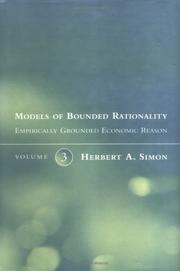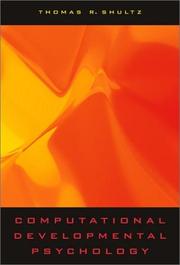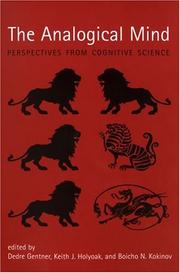| Listing 1 - 4 of 4 |
Sort by
|

ISBN: 0262023849 026252225X 026226773X 0585356076 9780262522250 9780262267731 9780262023849 Year: 1997 Publisher: Cambridge, Mass. : MIT Press,
Abstract | Keywords | Export | Availability | Bookmark
 Loading...
Loading...Choose an application
- Reference Manager
- EndNote
- RefWorks (Direct export to RefWorks)
Annotation
Autism --- Human information processing --- Genetic psychology --- Philosophy of mind --- Mind, Philosophy of --- Mind, Theory of --- Theory of mind --- Philosophy --- Cognitive science --- Metaphysics --- Philosophical anthropology --- Information processing, Human --- Bionics --- Information theory in psychology --- Perception --- Human genetics --- Psychology --- Autistic disorder --- Autism spectrum disorders --- Hyperlexia --- Autism. --- Genetic psychology. --- Human information processing. --- Philosophy of mind. --- Klinische psychologie --- specifieke problemen --- specifieke problemen. --- Cognitive psychology. --- COGNITIVE SCIENCES/General --- NEUROSCIENCE/General --- Psychology, Cognitive --- Autisme infantile --- Philosophie de l'esprit --- Psychologie génétique --- Traitement de l'information chez l'enfant --- Traitement de l'information chez l'homme

ISBN: 0262192055 0262192063 0262193728 0262519437 0262283646 0585159645 9780262283649 9780262193726 9780262519434 9780585159645 9780262192057 9780262192064 Year: 1982 Volume: 2 Publisher: Cambridge, Mass. London MIT Press
Abstract | Keywords | Export | Availability | Bookmark
 Loading...
Loading...Choose an application
- Reference Manager
- EndNote
- RefWorks (Direct export to RefWorks)
Offering alternative models based on such concepts as satisficing (acceptance of viable choices that may not be the undiscoverable optimum) and bounded rationality (the limited extent to which rational calculation can direct human behavior), Simon shows concretely why more empirical research based on experiments and direct observation, rather than just statistical analysis of economic aggregates, is needed.Throughout Herbert Simon's wide-ranging career--in public administration, business administration, economics, cognitive psychology, philosophy, artificial intelligence, and computer science--his central aim has been to explain the nature of the thought processes that people use in making decisions.The third volume of Simon's collected papers continues this theme, bringing together work on this and other economics-related topics that have occupied his attention in the 1980s and 1990s: how to represent causal ordering formally in dynamic systems, the implications for society of new electronic information systems, employee and managerial motivation in the business firm (specifically the implications for economics of the propensity of human beings to identify with the goals of organizations), and the state of economics itself.Offering alternative models based on such concepts as satisficing (acceptance of viable choices that may not be the undiscoverable optimum) and bounded rationality (the limited extent to which rational calculation can direct human behavior), Simon shows concretely why more empirical research based on experiments and direct observation, rather than just statistical analysis of economic aggregates, is needed.The twenty-seven articles, in five sections, each with an introduction by the author, examine the modeling of economic systems, technological change: information technology, motivation and the theory of the firm, and behavioral economics and bounded rationality.
Economics --- Social choice --- Decision making --- Industrial organization --- Addresses, essays, lectures --- Psychological aspects --- Industrial organization. --- Behavioral economics --- Behavioural economics --- Business management --- Decision making. --- Economics. --- Social choice. --- Addresses, essays, lectures. --- Psychological aspects. --- ECONOMICS/Microeconomics --- Choice, Social --- Collective choice --- Public choice --- Choice (Psychology) --- Social psychology --- Welfare economics --- Industries --- Organization --- Industrial concentration --- Industrial management --- Industrial sociology --- Economic theory --- Political economy --- Social sciences --- Economic man --- Deciding --- Decision (Psychology) --- Decision analysis --- Decision processes --- Making decisions --- Management --- Management decisions --- Problem solving --- Economics - Psychological aspects --- Economics - Addresses, essays, lectures --- Social choice - Addresses, essays, lectures --- Decision making - Addresses, essays, lectures --- Economics - Psychological aspects - Addresses, essays, lectures --- Industrial organization - Addresses, essays, lectures

ISBN: 9780262194839 026219483X 0262303035 9780262303033 0262529157 Year: 2003 Publisher: Cambridge, Mass. : MIT Press,
Abstract | Keywords | Export | Availability | Bookmark
 Loading...
Loading...Choose an application
- Reference Manager
- EndNote
- RefWorks (Direct export to RefWorks)
An overview of the emerging discipline of computational developmental psychology, emphasizing the use of constructivist neural networks.Despite decades of scientific research, the core issues of child development remain too complex to be explained by traditional verbal theories. These issues include structure and transition, representation and processing, innate and experiential determinants of development, stages of development, the purpose and end of development, and the relation between knowledge and learning. In this book Thomas Shultz shows how computational modeling can be used to capture these complex phenomena, and in so doing he lays the foundation for a new subfield of developmental psychology, computational developmental psychology.A principal approach in developmental thinking is the constructivist one. Constructivism is the Piagetian view that the child builds new cognitive structures by using current mental structures to understand new events. In this book Shultz features constructivist models employing networks that grow as well as learn. This allows models to implement synaptogenesis and neurogenesis in a way that allows qualitative changes in processing mechanisms. The book's appendices provide additional background on the mathematical concepts used, and a companion Web site contains easy-to-use computational packages.
Cognitive psychology --- Developmental psychology --- Developmental psychology. --- Cognitive science. --- Science --- Philosophy of mind --- Development (Psychology) --- Developmental psychobiology --- Psychology --- Life cycle, Human --- COGNITIVE SCIENCES/General --- COGNITIVE SCIENCES/Psychology/Cognitive Psychology

ISBN: 0262316056 0262072068 9780262072069 0262571390 9780262571395 9780262316057 Year: 2001 Publisher: Cambridge, Mass. : MIT Press,
Abstract | Keywords | Export | Availability | Bookmark
 Loading...
Loading...Choose an application
- Reference Manager
- EndNote
- RefWorks (Direct export to RefWorks)
Analogy has been the focus of extensive research in cognitive science over the past two decades. Through analogy, novel situations and problems can be understood in terms of familiar ones. Indeed, a case can be made for analogical processing as the very core of cognition. This is the first book to span the full range of disciplines concerned with analogy. Its contributors represent cognitive, developmental, and comparative psychology; neuroscience; artificial intelligence; linguistics; and philosophy.The book is divided into three parts. The first part describes computational models of analogy as well as their relation to computational models of other cognitive processes. The second part addresses the role of analogy in a wide range of cognitive tasks, such as forming complex cognitive structures, conveying emotion, making decisions, and solving problems. The third part looks at the development of analogy in children and the possible use of analogy in nonhuman primates.ContributorsMiriam Bassok, Consuelo B. Boronat, Brian Bowdle, Fintan Costello, Kevin Dunbar, Gilles Fauconnier, Kenneth D. Forbus, Dedre Gentner, Usha Goswami, Brett Gray, Graeme S. Halford, Douglas Hofstadter, Keith J. Holyoak, John E. Hummel, Mark T. Keane, Boicho N. Kokinov, Arthur B. Markman, C. Page Moreau, David L. Oden, Alexander A. Petrov, Steven Phillips, David Premack, Cameron Shelley, Paul Thagard, Roger K.R. Thompson, William H. Wilson, Phillip Wolff
Cognitive psychology --- Symbolism (Psychology) --- Analogy --- Similarity (Psychology) --- Cognition --- #PBIB:2001.2 --- Symbolism in psychology --- Psychoanalysis --- Psychology --- Paired-association learning --- Perception --- Knowledge, Theory of --- Reasoning --- COGNITIVE SCIENCES/General --- COGNITIVE SCIENCES/Psychology/Cognitive Psychology --- Symbolism (Psychology) - Congresses. --- Analogy - Congresses. --- Similarity (Psychology) - Congresses. --- Cognition - Congresses.
| Listing 1 - 4 of 4 |
Sort by
|

 Search
Search Feedback
Feedback About
About Help
Help News
News